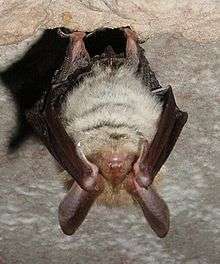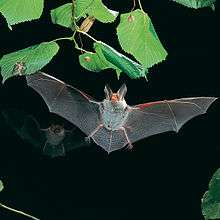Bechstein's bat
| Bechstein's bat | |
|---|---|
 | |
| Scientific classification | |
| Kingdom: | Animalia |
| Phylum: | Chordata |
| Class: | Mammalia |
| Order: | Chiroptera |
| Family: | Vespertilionidae |
| Genus: | Myotis |
| Species: | M. bechsteinii |
| Binomial name | |
| Myotis bechsteinii Kuhl, 1817 | |
 | |
Bechstein's bat (Myotis bechsteinii) is a species of vesper bat found in Europe and western Asia, living in extensive areas of woodland.
Description
It is a medium-sized and relatively long-eared bat. The adult has a long, fluffy fur which is reddish-brown above and gray-white below. It has a pinkish face, and its ears are long and broad. The wings are dark brown and rather broad, with the membrane attached to the base of the feet.[2]
Habits
It has a rather delicate and fluttering flight, and is adapted to catching moths and other small nocturnal insects. Tree holes are used for roosting and hibernation during the winter. Mating happens in autumn, and delayed fertilization means that young (one per female) are born early in the following summer.
Range
Bechstein's bat can be found in the following countries: Austria, Armenia, Azerbaijan, Belarus, Belgium, Bosnia and Herzegovina, Bulgaria, Croatia, Czech Republic, Denmark, France, Georgia, Germany, Hungary, Iran, Italy, Liechtenstein, Republic of Macedonia, Moldova, Montenegro, Netherlands, Poland, Portugal, Romania, Russian Federation, Serbia, Slovakia, Slovenia, Spain, Sweden, Switzerland, Turkey, Ukraine, United Kingdom and Iran.[1]
Habitat
It will both roost and forage in suitable woodland of at least 25 hectares (62 acres) in size, and only rarely ventures outside them.
In the United Kingdom, Bechstein's bat is found in the Forest of Dean and Herefordshire. In 2009 a detailed study by The Bat Conservation Trust of 10 counties took place to determine the range of the Bechstein's bat and in 2010 a lactating female Bechstein's was discovered in Grafton Wood, an Ancient Wood originally part of the Forest of Feckenham and jointly owned by the Worcestershire Wildlife Trust and Butterfly Conservation, suggesting that there was a breeding colony in the wood or close by. The following year Bechstein's were again found at Grafton Wood and also at Trench Wood, also in Worcestershire . The People's Trust for Endangered Species are funding further research work at Grafton Wood.[3] A single male was caught and recorded near Colby in Southern Pembrokeshire.[4]
It frequently roosts in old woodpecker holes, with oak and ash seeming to be the most important for the species.
Protection
Bechstein's bat is protected under the European Habitats Directive.
In the UK it is one of the region's rarest and most endangered species, where it likely that no more than 1,000 individuals exist in the whole region. Woodlands containing it may be considered for notification as a Site of Special Scientific Interest and may attract a grant under Natural Englands Environmental Stewardship scheme. On the rare chance one is spotted in the wild, authorities suggest immediately reporting it to a local batgroup or the wildlife trust.
Echolocation

The frequencies used by this bat species for echolocation lie between 35 and 108 kHz. Its echolocation calls have the most energy at 61 kHz, and have an average duration of 3.3 ms.[5][6] Most of its echolocation is in the 50–60 kHz range.
References
- 1 2 Hutson, A.M.; Spitzenberger, F.; Tsytsulina, K.; Aulagnier, S.; Juste, J.; Karataş, A.; Palmeirim, J. & Paunović, M. (2008). "Myotis bechsteinii". IUCN Red List of Threatened Species. Version 2008. International Union for Conservation of Nature. Retrieved 23 March 2013.
- ↑ Sterry, Paul (2005). Complete British animals. London: Collins. p. 48. ISBN 9780007201372.
- ↑ Bats about Bechstein’s James Hitchcock, Worcestershire Life, August 2012 p99
- ↑ National Biodiversity Network website map.
- ↑ Parsons, S. and Jones, G. (2000) 'Acoustic identification of twelve species of echolocating bat by discriminant function analysis and artificial neural networks.' J Exp Biol., 203: 2641-2656.
- ↑ Obrist, M.K., Boesch, R. and Flückiger, P.F. (2004) 'Variability in echolocation call design of 26 Swiss bat species: Consequences, limits and options for automated field identification with a synergic pattern recognition approach.' Mammalia., 68 (4): 307-32.
External links
- Woodland Management For Bats Guide
 Media related to Myotis bechsteinii at Wikimedia Commons
Media related to Myotis bechsteinii at Wikimedia Commons Data related to Myotis bechsteinii at Wikispecies
Data related to Myotis bechsteinii at Wikispecies
